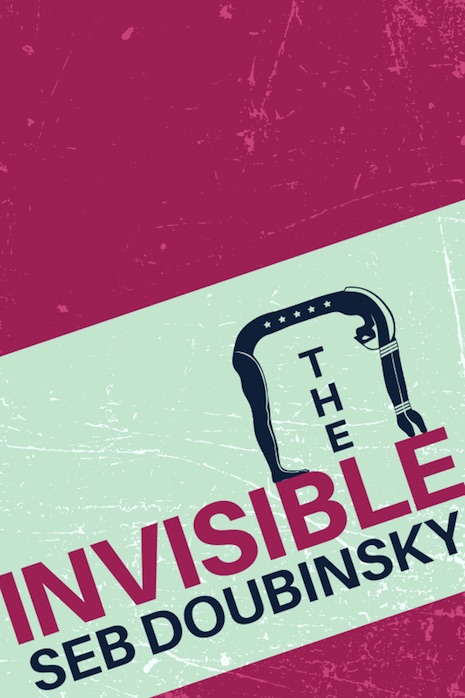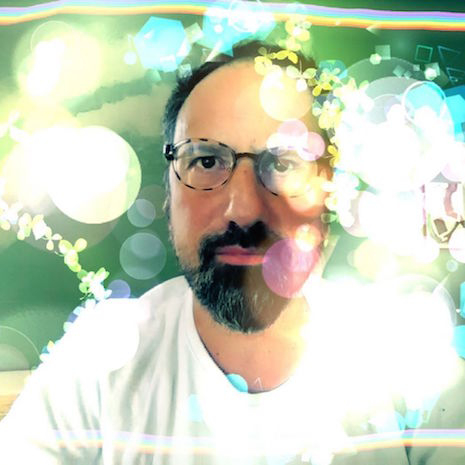
At the end of March, the writer Séb Doubinsky should have been traveling across America giving readings from his latest novel The Invisible. Picture him in a busy, crammed bookshop wearing a plaid shirt, leather jacket with steel-rimmed glasses and neatly-trimmed beard. He sits at a table with a pile of books to his left, a glass of water to his right, the audience in front. Some sit in chairs, some stand around the edges with arms folded, heads tilted, all listening to Doubinsky’s strong, clear voice. There are questions then a long-line of bright-eyed readers waiting to shake his hand, take pictures, and get their copies signed.
In another reality this all happened. Turn the page, there’s someone at the back, leaning against shelves laden with bright, clean paperbacks asking:
What is your earliest memory?
Sébastien Doubinsky: My earliest memory is actually a patchwork of scenes from my childhood in America, between 1966 and 1968. I can see myself playing with my favorite toys, which were rubber Mattel astronauts, watching black-and-white Spiderman cartoons sitting upside down on the sofa, riding in my father’s dark blue huge station-wagon, going to Space Needle’s fun park and having a blast… Very vivid memories, in color, which have certainly influenced the very way I write, like Pop Art—or rather Anti-Pop Art, as Rosenquist called it—and Punk well, much later.
But a virus stopped all this. Doubinsky is in lockdown at his home in Denmark. If anyone could have seen such a deadly pandemic coming then it was him. He had already written about a similar outbreak in Absinth—the story of the Apocalypse with ancient Gods attempting a new order, the publishing of a new gospel according to Jesus (“Burn all churches”), and an outbreak of Ebola that claims the lives of the President and the Vice-President. There’s hope for us yet! Doubinsky saw it coming.
What the Corona crisis taught us: all useful people are underpaid and all useless people are overpaid and decide who will live or die.
Peter Parker was bitten by a radioactive spider that gave him, in some unfathomable way, arachnid powers of strength and agility to jump great heights, climb walls, and have a tingling spider sense that alerted him to danger. At some point, most kids want to be Peter Parker, but then they give up on their imagination and subscribe to another’s imposed order.
August 1963, copies of The Amazing Spider-Man #3 were in bookshop carousels when Sébastien Doubinsky was born at a Parisian cinema. Spidey was fighting a new enemy the “grotesque Dr. Octopus.” Doubinsky’s parents had been watching a Hollywood western. They never saw the end of it. Celebrating the birth of a son was more important. Arriving at a hospital, Mother and child were doing fine. Father then found some work in America. Doubinsky spent his early years growing-up in the States watching TV and marveling at the unchanging blue sky. What’s your earliest memory? “I already answered that.”
Back in Paris, Doubinsky discovered a copy of William S. Burroughs’ The Ticket That Exploded while visiting his Aunt’s apartment on the Avenue René Coty. It was a weird looking book with a weird sounding title. Doubinsky sat down and read it. He was blown away. He might not have understood it but he knew he loved it. He had discovered his superpowers.
When did you first think seriously about becoming a writer and why?
SD: It’s rather a difficult question to answer, as there were many stages in this decision—at least until it became a rationally formulated one. I come from a very intellectual background, culturally mixed (Jewish and Catholic, but both my parents were leftists and radical atheists) and extremely open to other cultures. What’s more, both sides of my family had been very active in the French Résistance during World War Two, and I therefore inherited quite a strong human-rights ethic. All this to say that literature was not a passive element of my upbringing, but was seen as a powerful object that could serve the best or the worst causes, and that it was important.
Growing up I loved poetry, and for a long time wanted to be a poet (but also a painter, until I discovered I was colorblind…) but little by little, prose seeped in and took more and more space. I began to write some short stories in my late teenage years, but still not really considering dedicating myself seriously. The tragedy that sealed my writer’s fate was the suicide of my beloved cousin Bruno, then, like me, 20 years old. He had introduced me to punk and New Wave—especially The Cure, Bauhaus and all the darker stuff—and in his last note, he told me I should carry on writing “my great stuff.” That’s when the weight of words and the responsibility attached to writing hit me like a runaway train. That’s the day I really became, in my eyes, a “writer.”

More from Sébastien Doubinsky, after the jump…





